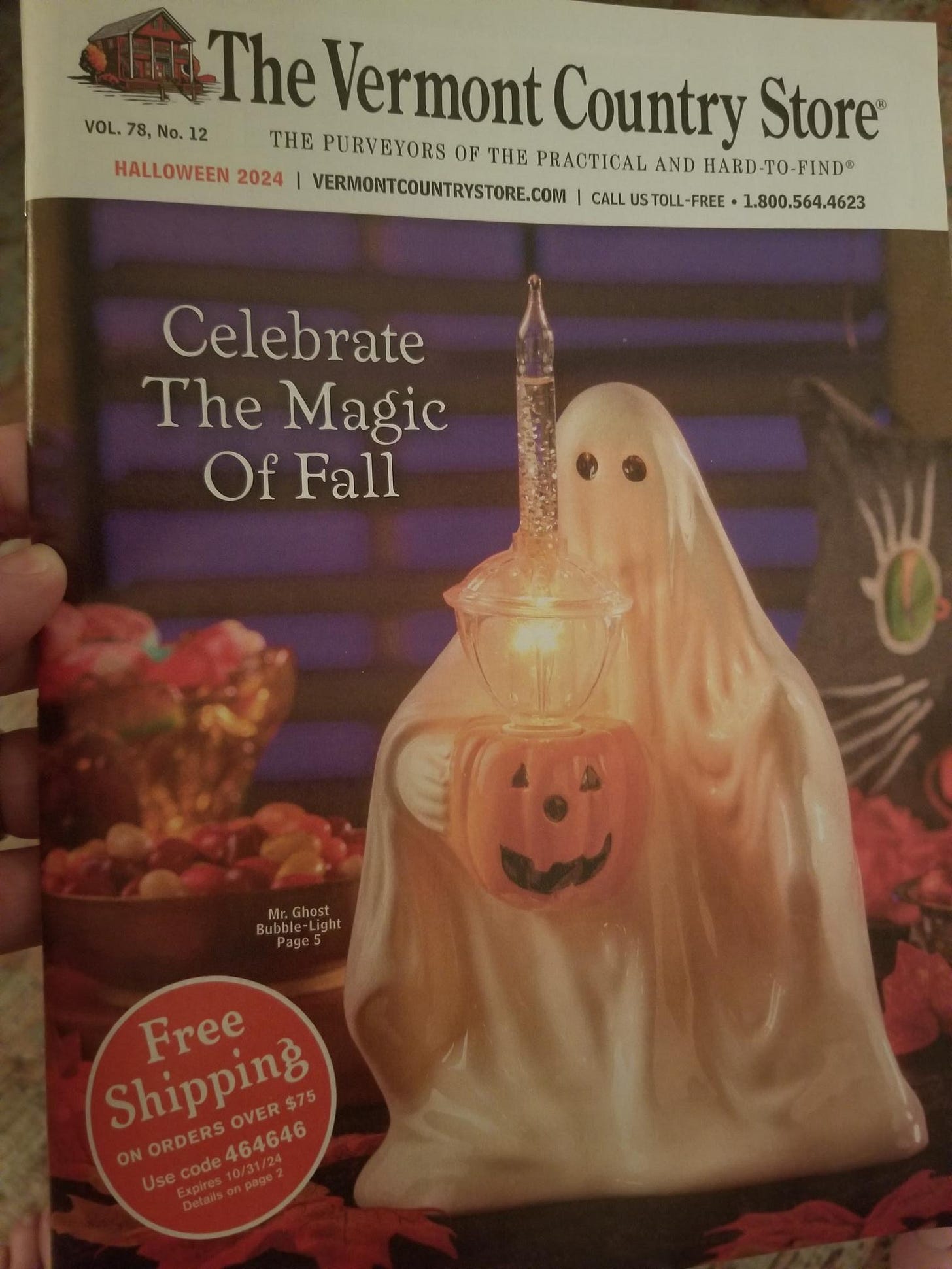Fall Book Review: The Psychology of Money is The Vermont Country Store catalog of Fundraising Books
I love catalogs. And I loved The Psychology of Money. Please bear with me.
The staff here at Fundraising for Breakfast mark the changing of the seasons with the arrival of The Vermont Country Store catalog in the mail. As should you.
For those unfamiliar with The Vermont Country Store, it boasts being “purveyors of the practical and the hard-to-find” and it rarely disappoints. I don’t know how I got on their distribution list, but I thank my heavenly stars I’m on it. It’s pure indulgence. It’s like taking a warm bath—browsing seasonal offerings I will never buy from a store I don’t shop at.

I’m one of the more accomplished catalog readers in my circle. (Enjoy this throwback clip from Best in Show if you also feel so lucky to have been raised amongst catalogs). Catalog reading is an acquired skill that involves careful page flipping, scanning, and copious ooohhhh-ing and aaaahhhh-ing. You flip forward and you flip back. You skip around. You linger over stuff that stands out to you. You look around for things the people in your life might like.
I’ve read Morgan Housel’s The Psychology of Money multiple times now and now read it the same way I browse through The Vermont Country Store catalog, albeit with one major difference. I probably won’t buy any of the pricey items featured in the catalog, but no fundraiser can afford to ignore Housel’s points about how we all behave, think, and feel about money.
Housel’s The Psychology of Money turns on a simple point: people make important financial decisions over the dinner table, not over a spreadsheet. Saving, investing, and managing risk in our financial lives stem from how we were raised, what happened in the economy during our most impressionable years, and the stories we tell ourselves about what money does. These realities, Housel argues, get smushed together in our minds, hearts, and pocketbooks and define our relationships to money. It’s not a fundraising book, but it should be. The Psychology of Money is for anybody eager to better understand their own financial motivations and a must-read for fundraisers who need to be better attuned to how donors think and feel about their money before we ask them to give it away.
Three things make The Psychology of Money so readable and so reminiscent of my love of catalogs.
It’s short and episodic: Housel gets right to the point in 20 short chapters (each blessedly free of market technobabble) that investigate the psychological underpinnings of financial management, investment strategy, and market assumptions. You don’t need to read them in order, but you can.
Scan through these chapters and find Housel challenging readers to reexamine established narratives about money. What’s the difference between being wealthy and being rich? Why do humans struggle with long-term planning? What stories do we fall back on to make sense of our money habits? Find the question that feels most pressing to you, skip around, and you’ll find it developed in different ways across multiple chapters.
It uses stories to draw out how feelings drive financial decisions: Whether it’s the story of the secret millionaire next door; the investors for whom there’s never enough; or the art collectors who play the long game, Housel illustrates financial points through relatable stories. The boldest is his own. In “Confessions,” he shares how the need for independence drives his financial planning: “We own our house without a mortgage, which is the worst financial decision we’ve ever made but the best money decision we’ve ever made” (216). The stories throughout The Psychology of Money help you better understand the difference between a “financial decision” and a “money decision.”
It’s epigrammatic: This is a weird reason to recommend a book, but flip through The Psychology of Money and you’ll find on every other page a memorable nugget of behavioral or financial insight you’ll carry with you long after you put it down:
“Risk and luck are doppelgangers” (32)
“Money’s greatest intrinsic value…is its ability to give you control over your time” (84)
“People are poor forecasters of their future selves” (150)
“Pessimism just sounds smarter and more plausible than optimism” (179)
If you’re a fundraiser, The Psychology of Money will have you to take a beat before your next donor meeting. It’ll teach you to be more attentive to how donors feel about their money, where your donor’s feelings come from, and even why they’re talking to you in the first place.
I’ve read The Psychology of Money enough times now that I’ve stopped reading it cover-to-cover. I scan through it like I do The Vermont Country Store catalog. It’s eminently scannable.
I spend a couple minutes reading one short chapter, skip ahead to another, and then skip back again. I flip through different chapters and pick up a few pointers, here, and flip around and find more of Housel’s one-liners, there. All of them stick. When I’m scanning around, I think about how I feel about money. And as I scan some more I start to really think about how my friends, colleagues, and donors think about their money, too.
And no matter how many times you pick it up and put it back down, you always find something new to look at and think about until you pick up it again (or your kids throw it away without telling you).
Now if you’ll excuse me, I’m off to write a letter to The Vermont Country Store and petition for books like Housel’s The Psychology of Money to be featured in their upcoming catalogs.
I am, after all, one of their most devoted readers. Even if I am their worst customer.








I'm amazed that you make money and fundraising -- topics that I'm usually not interested in -- fun and relatable.
The Vermont Country Catalog takes me right back to 1969. I can get some “gee your hair smells terrific “ shampoo, or some “Loves Baby Soft” if I want to roll that way. Some Yardley’s slickers, for lip gloss. . . Good times. I take my money advice from the Beatles: Money can’t buy you love.